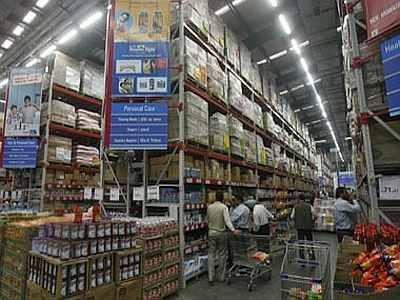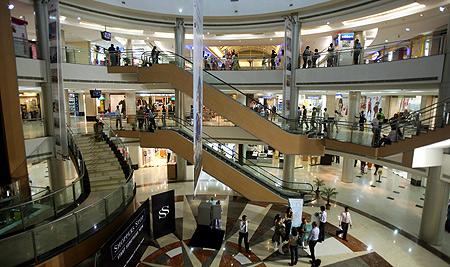 | « Back to article | Print this article |
Rajan Mittal on why jobs won't be lost in retail sector
Bharti Enterprises has had a joint venture with Walmart in the wholesale trade for years in India.
Karan Thapar talks to the company's vice-chairman and managing director, Rajan Bharti Mittal, on CNN-IBN's Devil's Advocate programme, in the wake of the government's decision to allow foreign direct investment (FDI) in multi-brand retail, on the perception among many that the move would have a hugely adverse impact on traditional retailing and jobs. Edited excerpts:
Let's start with the effect of FDI on small retailers and kirana stores. In Thailand, in the five years after 1997, when FDI in the sector was permitted, up to 60 per cent of Thai-owned grocery stores closed down. How can you be confident that won't happen in India?
Modern or organised retailing has been in India for 10 years. Big business houses are already in retail. Here, we're only talking about the colour of the money, not saying we will not allow organised retailing versus unorganised retailing.
Click NEXT to read more...
Rajan Mittal on why jobs won't be lost in retail sector
So, you say if the big domestic business houses haven't had a deleterious impact, why should FDI?
Exactly, modern retailing is only about six per cent (of the total) today and is likely to grow to about 20 per cent in about 20 years.
Between 1981 and 1999, when modern FDI-based retailing became big in the UK, the number of British independent stores fell by 50 per cent. If it can happen in Britain, it can happen in India too.
There are two different markets we are addressing. Ours are more akin to those of China, Brazil, Mexico, Japan, and I have seen those. Real estate in this country is very different than elsewhere in the world.
There is nothing known as real estate for retailing. Where would I be able to get a mega box or 50,000 sq ft in the middle of a city?
You mean the cost in India is such that you won't be able to operate in the same way as Walmart or Tesco would have operated in China or in a British country?
Absolutely.
Click NEXT to read more...
Rajan Mittal on why jobs won't be lost in retail sector
A study released by Business Line about six-seven years ago said if modern Western retailers were to acquire a 20 per cent share in the Indian market, something they could easily do, eight million jobs could be lost.
Nobody has been able to explain how those jobs would be lost. If you look at our kirana retailing, it is not more than two people employed per store. We must compare apples to apples; here, the comparison is apples to oranges.
Look at the mom-and-pop stores or the kirana stores that we have - 500-700 sq ft is what they have, no more than 500-600 stock units (SKUs) on the shop floor. In modern retailing, we don't have a box smaller than 2,500 sq ft anywhere. We employ 17 people in that box and 3,200 SKUs. In a large box of 50,000 sq ft, about 200 people.
Retailers are the second-largest employer in India; the sector generates 44 million jobs. Most of those jobs are what poor, uneducated people without skills have. If those were to be diminished, the very poorest and the most vulnerable would be hit.
People who pass high school are educated, so to speak, not employable. We train these people for three to four weeks in our retail academies and they are on the shop floor today.
In Punjab, I have 6,000 people employed because we opened stores. Can even six people, let alone 60, tell me they have been displaced because of them? No. And, they are all bright...
Click NEXT to read more...
Rajan Mittal on why jobs won't be lost in retail sector
You say modern retail will not only give more jobs compared to what traditional retail offers but better quality jobs as well?
Absolutely.
Walmart has been picked upon by most people as a target. Walmart is your partner and you hope to deepen the relations as the years go on. The UNI Union Global study of Walmart's record, issued in March this year, says, "The presence of a Walmart store has had a devastating impact on small businesses around the surrounding areas." It then quotes researchers from the US census bureau that they found the entry and growth of hyper markets had a substantial negative impact on job growth and the survival of single unit and small-chain stores. If that is to happen in India, you would devastate traditional retail.
I have said that model is not working in India; we have a different model. We have with Walmart opened 18 big boxes, meaning the 50,000 sq ft ones...
What the world calls hyper markets?
For us, it is really compact hyper market; a hyper market is 200,000-300,000 sq ft. They are wholesale boxes 700,000 kirana stores are attached. Somebody should talk to them. Instead of going to 30 distributors of all kinds, there under one roof, quality of product, pricing which is better, shopping experience which is better...
Click NEXT to read more...
Rajan Mittal on why jobs won't be lost in retail sector
Yes, but at the moment, those are only for wholesale shopping. When it becomes available for retail shopping, I quote to you from a study done by New York City, called the 'Walmart economic footprint', dated January 2010. It says, "For every two jobs Walmart creates, three are lost. Atlantic City says when Walmart entered the Austin neighbourhood of Chicago in 2006, within two years 82 of 306 small stores shut down. If you have that impact when you become a retail seller, you will devastate the retail trade in India.
This study is for a type of market very different from India. This sort of real estate is not going to be in our cities, people are not going to shop 20 miles away, people don't have transportation, big houses. We don't purchase goods for months like Americans do.
You say the Indian lifestyle, Indian shopping habits, will protect the retail trade and the small retailer will survive. Jayati Ghosh, one of India's most respected economists, has written in The Guardian that for every Walmart supermarket opening in India, about 1,400 small retailers will be displaced and there will 5,000 job loses. She translates the American experience with all the conditions that you have attached to the Indian experience and she is saying this will be the outcome here.
So, why has the outcome not happened till date, with big boxes already opened?
Because at the moment you are wholesalers, not retailers.
The big business houses in this country have got 4,800 stores today. It was 5,600 a year before, they have declined. Because of the cost of real estate, the cost of people, the cost here is very different from outside.
So, what Walmart has done in America will not happen in India because the Indian lifestyle is different and the strength of the Indian domestic corner store is stronger?
Far stronger. And, the other issue is about consumers.
Rajan Mittal on why jobs won't be lost in retail sector
I'll come to that. A second concern says because India is a high manufacturing base country, a retailer like Walmart will import a vast multitude of everyday items from all over the world and particularly from low-cost countries. Are you likely when you team with Wal-mart and become a retail supplier to flood India with cheap Chinese imports, which would devastate manufacturing and once again affect jobs?
What stops anybody from importing today? Why should one company be able to do it and not the others?
Walmart already has importers lined up abroad and it has the scale of operation in India which small retailers don't.
That's the fallacy. If you come to my 18 wholesale stores which are supposed to do the same things, at least for sale to the kirana stores, you'll find 95 per cent or more goods are manufactured in India. All of food, fast moving consumer goods, completely made in India. This will continue...the food habits of India between, say, Punjab and Maharashtra, are so diametrically opposite...
The third concern about Walmart - remember, its annual revenue is over $420 billion — is that it will go in for cost cutting to win market share, then ramp up prices and have dominant control over the market as well as pricing.
We have a law for printing the Maximum Retail Price on a product; nobody will a loss leader for years. You cannot jack up prices because there is something called a ceiling. People have not understood this. Then, there is the competition commission.
Click NEXT to read more...
Rajan Mittal on why jobs won't be lost in retail sector
In every country where Walmart operates, they have progressively cut the price for the consumer, then ramp up the price and similarly having increased the price for the farmer, progressively lower it... so a squeeze at both ends.
Look at the US, where they do $300 bn revenue -- they're just 11 per cent of the market. They employ two million and save $230 bn to the consumer. So, it's a myth that they are going to squeeze both sides. In India, have about 10,000 farmers engaged; somebody should meet them and see what we have done to them.
The last concern about Walmart is its reputation in America for being a very poor quality employer - lowest wages, unionisation frowned upon if not prohibited and workers made to toil extremely long hours.
There is no such model which is going to be brought from somewhere and then implanted. We have a 50:50 joint venture.
When Walmart becomes a retailer, you will not allow them to have 51 per cent?
The talks have started. When there was an opportunity to go 100 per cent in wholesale, they went 50:50 with Bharti. With the opening of the front end, the discussion is on the table and hopefully the relationship that we have enjoyed in the past five years will continue.
Click NEXT to read more...
Rajan Mittal on why jobs won't be lost in retail sector
The Bharatiya Janata Party has more or less said that if it comes to power, it will revoke permission for FDI in retail. Does that worry you?
Reforms are here to stay. So many governments have been in place for the past 20 years and they have followed the path.
They will see how farmers, manufacturers, employment generation, quality, the consumer, are all benefiting and how it's not really harming the kirana stores. States will start showing results. And, we hope, things will fall into place for the naysayers. I have seen many naysayers in the other field I have worked in, telecom, 15 years before.
As people watch political parties struggle over reforms, they have come to the conclusion that what is considered by many to be good economics doesn't seem to become good politics. Does it bother you as a businessman?
At the end of the day, if it is good economics, it is good for the country. If it is good for the country, as a citizen, it must be used.
As a businessman, how can you give confidence to politicians that, look, go ahead with good economics, don't worry if there is a short-term political cost.
We can only give confidence by doing things, by executing those policies in the right way.
You're saying, watch how we perform? That will prove to you what we were saying was right?
I hope so, I think so.








